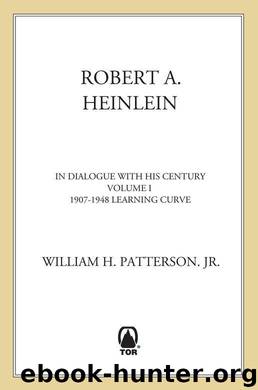Robert A. Heinlein: In Dialogue With His Century by Robert A. Heinlein & William H. Patterson Jr

Author:Robert A. Heinlein & William H. Patterson, Jr. [Heinlein, Robert A. & Patterson,, William H. Jr.]
Language: eng
Format: epub
Publisher: Tor Books
Published: 2010-08-17T04:00:00+00:00
Your urge to work on stories may be prophetic, or a symptom of one of two things. Either that the plant there is beginning to run reasonably smoothly, or that it’s—well, shapfu. The “hap” standing for “hopelessly and permanently,” and that your mind, whether you have or not, has decided that there is, none the less, a way to get along in chaos.41
Some progress was possible, even in “Snafu Manor,” as Heinlein’s group of friends and colleagues there had begun to call the Naval Air Experimental Station (their little corner of the Naval Aircraft Factory). “Snafu” is a military slang acronym, standing for “Situation Normal: All Fucked Up.”
Heinlein’s first evaluations as civilian engineer came in early March 1943—first-rate—and he was promoted from “Assistant M.E., P-2” to “Associate M-E, P-3,” with a nice bump in pay (from $2,600 to $3,200 per annum).
Sang was a young civil service engineer who had become part of the Heinleins’ social set. They found him very compatible, and he lived close by in downtown Philadelphia, too, so they saw each other frequently after work.
In June, Heinlein was detached again, this time to Pittsburgh, to recruit junior engineers for the AML.42
The war was not good to Robert and Leslyn Heinlein: the frustrations of a constantly increasing workload, searching for technical solutions that didn’t exist in the technology of 1943, flogging himself for not being at the front, and the bitterness over what he was not allowed to do, Robert was becoming humorless and superior. “Holiness is a bad habit, and one that frequently catches mutual admiration societies,” Bill Corson admonished him in August 1943. Leslyn’s workload, too, was constantly increasing, and she fretted over her sister and nephews in a concentration camp in the Philippines.
Both Robert and Leslyn were taking out their frustrations on at least one of their friends. Robert did notice the liquor disappearing at a greater rate than usual, but he thought Bill Corson was responsible. Corson came from his Army camp in New Jersey to spend the weekends with them frequently—perhaps too frequently, since in his letters of this period Heinlein often mentions having houseguests nearly every weekend, Corson mostly, and no alone time at all. But neither Robert nor Leslyn would say anything to discourage a man on active duty in the Army. Although Corson had “a wonderful-to-see effect on Heinlein père,”43 he could, he admitted, be socially oblivious.44 But he protested they were using on him the same tactics they used to keep Asimov’s puppyish energy under control (Asimov was charming and funny and enthusiastic and oblivious: if you didn’t tramp on him—hard!—he’d run you over innocently and cheerfully), and Corson felt they portrayed him as consistently and invariably wrong about anything and everything.
Leslyn complained that she felt taken for granted by Corson and relegated to household drudge while he was there. Any perceived threat to Leslyn brought out a swift and vehement response from Robert—by letter, since they had been dropping hints that Robert escalated into a firm instruction that they wouldn’t be having weeknight guests for a while.
Download
This site does not store any files on its server. We only index and link to content provided by other sites. Please contact the content providers to delete copyright contents if any and email us, we'll remove relevant links or contents immediately.
4 3 2 1: A Novel by Paul Auster(11026)
The handmaid's tale by Margaret Atwood(6834)
Giovanni's Room by James Baldwin(5868)
Big Magic: Creative Living Beyond Fear by Elizabeth Gilbert(4713)
Asking the Right Questions: A Guide to Critical Thinking by M. Neil Browne & Stuart M. Keeley(4557)
On Writing A Memoir of the Craft by Stephen King(4203)
Ego Is the Enemy by Ryan Holiday(3977)
Ken Follett - World without end by Ken Follett(3967)
The Body: A Guide for Occupants by Bill Bryson(3787)
Bluets by Maggie Nelson(3702)
Adulting by Kelly Williams Brown(3661)
Guilty Pleasures by Laurell K Hamilton(3576)
Eat That Frog! by Brian Tracy(3502)
White Noise - A Novel by Don DeLillo(3427)
The Poetry of Pablo Neruda by Pablo Neruda(3357)
Alive: The Story of the Andes Survivors by Piers Paul Read(3300)
The Bookshop by Penelope Fitzgerald(3220)
The Book of Joy by Dalai Lama(3211)
Fingerprints of the Gods by Graham Hancock(3205)
